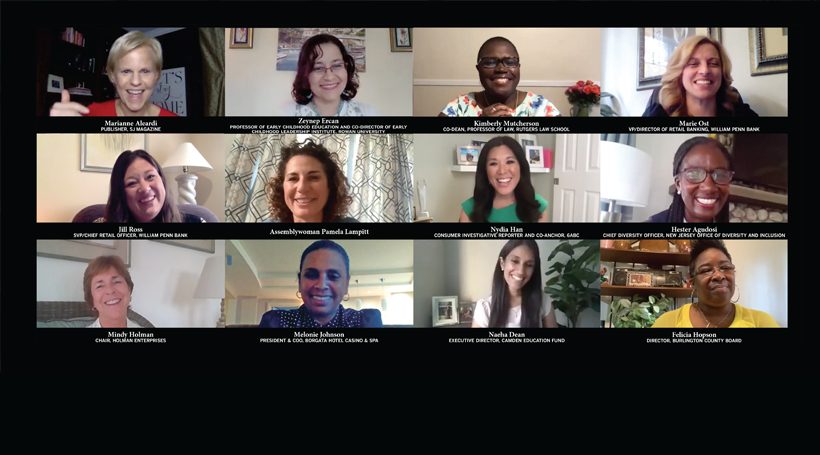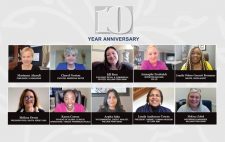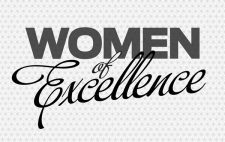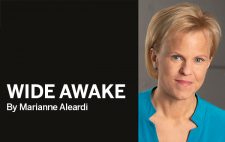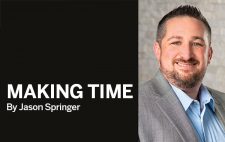Presented by

Every year, we invite prominent women to join us for an intimate dinner and conversation. Since the world is so different in 2020, this year’s roundtable was like no other. Although we couldn’t all be together sharing a meal, our time together on Zoom felt as intimate as always, maybe even more so. Our participants let down their guard to talk about their lives during the shutdown and how recent events have changed their way of thinking. They were brutally honest, sharing powerful personal stories. And once again, the women’s roundtable showed us how magic can happen when you bring together South Jersey women – even remotely – and ask them to talk about things that matter. It’s a phenomenal night.
Kimberly Mutcherson, Co-Dean, Professor of Law, Rutgers Law School
Nydia Han, Consumer Investigative Reporter and co-anchor, 6abc
Melonie Johnson, President & COO, Borgata Hotel Casino & Spa
Marie Ost, VP/Director of Retail Marketing, William Penn Bank
Felicia Hopson, Director, Burlington County BOARD
Hester Agudosi, Chief Diversity Officer, New Jersey Office of Diversity and Inclusion
Jill Ross, EVP/Chief Retail and Commercial Officer, William Penn Bank
Zeynep Ercan, Professor of Early Childhood Education and Co-Director of Early Childhood Leadership Institute, Rowan University
Naeha Dean, Executive Director, Camden Education Fund
Assemblywoman Pamela Lampitt
Mindy Holman, Chair, Holman Enterprises
On working from home…
In the initial period, I felt like I was freefalling. Although there are conveniences and flexibility when working from home, being at the office works better for me. I had conditioned myself that work is work, and home is home. It was hard for me to integrate them together.
Hester Agudosi
That first day back to the office after working at home was just so exciting. I was reminded that there was a different way to live life, and I actually enjoy the people who I work with.
Kimberly Mutcherson
It’s been an eye-opening experience for me. I found I really thrived. I got back to the basics and was able to accomplish more. I learned that what’s important is getting the job done and moving the business forward, plus there was none of that guilt from rushing out of the office to pick up my son.
Jill Ross
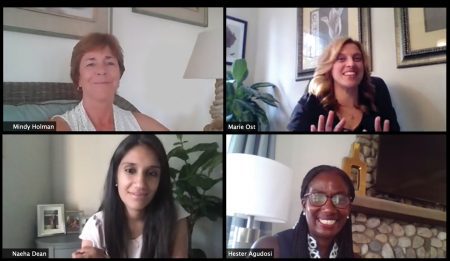
On what we learned during covid…
Downtime gave me the opportunity to mourn my father’s death. When work stopped, I was by myself and the pain really hit. Then I realized I didn’t have to be strong and try to deal with this all by myself. Without this downtime, I don’t think I would have ever processed it. It was the best thing that could have happened to me.
Melonie Johnson
I’ve been in public service my whole professional career and one of the things I always lamented about is, when it comes to government, we’re slow to adapt. So the government being able to take the entire workforce and transition everyone to working from home was one of the highlights of my public service career.
Hester Agudosi
While speaking with my students, I saw people who were quarantined alone and people who were in dire situations economically. There were racial disparities. Many communities suffered. Being able to connect virtually and see this has helped me. I’m going to be more of an advocate in the future.
Zeynep Ercan
My husband and I were both working fulltime from home with our 3-year-old and 1-year-old children. Camden schools had just closed down. We had thousands of students at home in Camden without devices to do at-home learning. There was so much urgency at work. At the same time there was so much immediacy of need at home with the little ones. It was hugely humbling and important for me to learn that I’ve got to be more flexible.
Naeha Dean
My big a-ha moment during all of this was when I had to have my first telehealth visit with a doctor. Three or 4 years ago I worked on legislation to allow for telehealth to be done in the state properly, effectively, efficiently and safely. And to have my first telehealth visit, I realized that things I do, things I have done, have made a difference in the quality of life for people even during a pandemic.
Pamela Lampitt
On how work has changed…
When we first had the closures, we had to furlough about 2,200 people. I’m the third generation of our family-owned business. We just celebrated our 96th year, and we never furloughed anyone before. Now, people who were furloughed are back, and we’ve had to lay off 400 people. It’s the hardest thing I’ve ever done in my life. It was devastating for a lot of people in our business.
Mindy Holman
There were individuals calling our office who never had to file for unemployment before. We had to walk them through the process, and for them it was really a challenge. You could hear their struggles because they were embarrassed. We tried to make them feel okay.
Pamela Lampitt
I thought communication among staff would be less, and actually, I found that people have been communicating in the best way and using every avenue they can.
Marie Ost
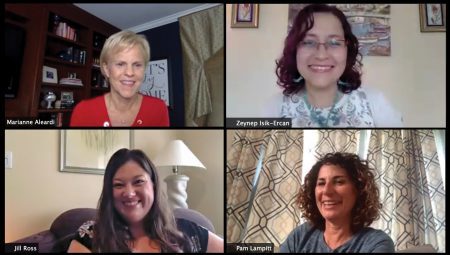
On the most trying days…
Even on days when I didn’t have to wake up early, I was waking up at 5 or 6 in the morning on the dot, and I would just wake up with all of this stress. I don’t really know how I got through it. I mean, I think I just realized there wasn’t time or opportunity to stop, so I just kept putting one foot in front of the other, and I continue to do that.
Nydia Han
We didn’t realize how quickly food insecurity was going to become a problem. It was really important for us to stay in tune with our residents, letting them know what programs we still had available and partnering with the food banks.
Felicia Hopson
On finding an outlet for stress…
I made a point to swim laps every day, which I was never able to do before. So no matter what time it was, I would make sure I swam for an hour.
Jill Ross
I wasn’t able to get to the gym when everything shut down. As a breast cancer survivor, if you gain weight, it’s very possible the cancer can come back. So I thought to myself, “Oh my gosh, what am I going to do?” I found an outdoor spin class in Burlington City – and I love it.
Felicia Hopson
I finally took a vacation to the Jersey Shore. I took a few surf lessons, and that one hour we were in the ocean was the best hour I’ve ever spent. I mean, it was the first time when I literally didn’t think about anything but whether I should catch that wave.
Nydia Han
On the protests…
The protests did not only occur in the U.S. – there were multiple protests across different countries. We are all individually responsible now as public leaders. There’s no way to say, “Oh, I’m not involved in this matter or, I feel uncomfortable speaking up.” We all now carry with us this responsibility to speak out about inequalities.
Zeynep Ercan
My board is all white. We started a book club to educate ourselves on race, and it was like the scales fell off my eyes. I would have told you I’m a nice person and I have a lot of diverse friends, but these books showed me all the things I took for granted. It took me until now to understand the privilege I had growing up in this country as a white person.
Mindy Holman
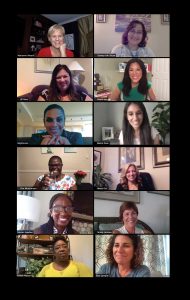
On a moment that changed their lives…
I was all set to go to college for acting, but my funding fell through for tuition, so I went to community college and worked part time at Commerce Bank. I just loved the banking industry. I was going to be an actress, but I loved how finance helps people through their life.
Jill Ross
I applied to a doctoral program, and I got wait-listed. My plan was to reapply the following year, and my dad said, “Why don’t you move home, see what the business is like.” I was going to do that for a year, and that was 34 years ago.
Mindy Holman
I was called into a meeting and asked if I was still interested in being a property president at a casino. I said yes, and then someone said, “Well, you know, this young man that I’m mentoring…” – and what I heard is there’s a mentorship program and I’m not being mentored, so I don’t have a chance of ever achieving that level of success with this company. I went home that night and I gave myself what I like to coin as my “24-hour pity party.” I went back to work, found a headhunter, and 4 weeks later I left the company. I am where I am right now because of it.
Melonie Johnson
A pivotal moment for me was just 3 years ago when a driver yelled, “This is America” at me. Those 3 simple words unleashed in me this anger I didn’t even know existed because she didn’t think someone with an Asian face could be an American. That led me to investigate race and racism and have interesting conversations about the diverse American experience. It also led me to find my voice and be a little bolder and more daring, and to speak up in a way that I never had before.
Nydia Han
I went down to New Orleans after I graduated from college and taught for 3 years after Hurricane Katrina. It was an important moment for me because I grew up in a first-generation immigrant family. My parents were very intent that I would pursue a certain career path, and teaching was not on that path. It was actually a long journey for me to convince my parents this is something I wanted to do for the long term.
Naeha Dean
On diversity…
Before when I was in the workforce, I felt like my hair had to be straightened. I had to speak a certain way, I had to like a certain food. I had to dress a certain way because I was the only person of color. It’s a balancing act for us, and it’s not always easy. I feel like I have grown into myself and I have a bigger voice because I’ve made it to a certain stature, but it’s my job to mentor young people and teach them how to navigate these waters. It’s not easy, but I have a responsibility to pass this on.
Melonie Johnson
I was appointed by Gov. Murphy to serve as the state’s chief diversity officer in 2018. For all intents and purposes, that role had not been in state government. Think about that – we are the fourth most diverse state in the union. I’m very pleased we now have an opportunity to not only exude this leadership, but hopefully define it as a best-in-class model for the nation.
Hester Agudosi
We’re speaking about things that no one was able to speak about before: equity, discrimination, mental issues. We’re allowing people to be vulnerable. If we continue to do the things we did in the past and not discuss the color of our skin or our mental health struggles because it makes certain people uncomfortable, then that conversation will never be had. These things are not taboo anymore.
Marie Ost
There were a lot of moments over the last few months, particularly with race issues, where I was incredibly vulnerable with my faculty and my students about how I was feeling as a black woman, and particularly as a black woman who’s raising black children in this country. Those were conversations that every single person who has had this job before me would not have been able to have in the same way, because I’m the first black person and the first woman to have this job.
Kimberly Mutcherson
We opened up discussion for anybody who wanted to meet with senior management, and we had one young lady, a white part-time teller, who wanted to meet with myself and the CEO over Zoom. She challenged us. She said, “I don’t see enough diversity here at the bank.” And I told her she was absolutely right. There’s no excuses for it. That’s how history has been, and we have to change it.
Jill Ross
When I was growing up as an Asian American, I tried so hard, frankly, to be white and to fit in. And I’m realizing more and more as I get older – and with all of these things that are happening – that it is really important that I bring my Asian-American self to the workplace and let that contribute to my work. That’s a gift from what is happening right now.
Nydia Han
On social media…
I ask myself: How does it serve me to respond to this person? None of us have an infinite pool of energy, so figuring out where you’re going to use your energy is critical.
Kimberly Mutcherson
I assessed who was on my social media and realized it may not serve me in a positive way to stay connected with some of these people. I don’t know why it took this pandemic for that to happen, but it did, and it’s been an eye-opening experience.
Jill Ross
I assumed that anyone who didn’t like my message on Facebook was racist, stupid, uneducated and someone unlike me. What I realized when I had the opportunity to sit down and talk to them is we have a lot more in common than we realized.
Nydia Han
I don’t respond to any comments on social media unless it’s a real issue. That’s just been my golden rule. I don’t respond: good, bad or indifferent, period.
Felicia Hopson


